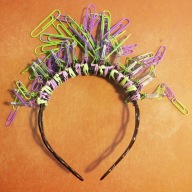 I’m an editor, and I’m good with words. I work with words more or less every day, in one way or another, and people pay me a respectable amount to do it … and even when I am not editing, often I am reading or writing for pleasure. And I’ve been doing this for the best part of twenty years. I run a successful business, with great clients and work I mostly enjoy. But sometimes, when I am talking to people about what I do, my facility with words deserts me, and I crumble. I forget all of this positive stuff, and descend into a mire of self-deprecation.
I’m an editor, and I’m good with words. I work with words more or less every day, in one way or another, and people pay me a respectable amount to do it … and even when I am not editing, often I am reading or writing for pleasure. And I’ve been doing this for the best part of twenty years. I run a successful business, with great clients and work I mostly enjoy. But sometimes, when I am talking to people about what I do, my facility with words deserts me, and I crumble. I forget all of this positive stuff, and descend into a mire of self-deprecation.
I went to the SfEP conference at the weekend, had a brilliant time catching up with friends and colleagues, and came back fired up with loads of new ideas and objectives for continuing to develop my editorial business. And yet … over the course of the weekend, still I came out with some absolute clangers when called upon to describe my professional self and what I do. There I was, damning myself with faint praise, over and over again. And to be fair, I know I am far from being the worst offender the editorial community has ever seen in this department … Editors tend to be nice people, and often they are modest people, too. Which is great when it comes to putting ego to one side and respecting the author’s voice … but not always so great when it comes to speaking up, putting yourself forward and telling people in no uncertain terms what you can offer.
Here’s a small selection of things I found myself saying, and what I need to remember they really mean next time I open my mouth.
“Being an editor is all I really know how to do”
For a start, this isn’t even true! I have a degree in architectural studies, and worked for an architect for a year in Malaysia after graduating, before I decided to work in publishing instead. But the point is, I should be proud of the fact that I have devoted my career so far to working in this fantastic industry. I should emphasise it rather than sounding embarrassed, as if it were the result of some kind of failure of imagination. I love publishing, and I worked extremely hard to get a foothold back in the 1990s. These days I know a lot about it, and in several distinct areas too (trade non-fiction for adults and children, and educational resources, if you’re asking). I’ve managed or edited thousands of projects, and I know exactly how to slot into lots of bits of the process – from project management, to development editing, to copy-editing, to proofreading, to localisation. And I work in InDesign, too. In short, I’m passionate, versatile and extremely experienced.
A similar principle would also apply to someone who didn’t work in publishing before they became a freelance editor, though. I’ve lost count of the times I have heard people say they have no experience … forgetting to mention the decades of relevant and transferrable experience they have amassed doing other things.
What I should say: “I’m a publishing veteran, with almost 20 years’ wide-ranging editorial experience”
“Speaking in front of a room full of people terrifies me”
This is sort of true – I am the kind of person who dreads the school gates, because I might have to talk to people … and I even like quite a few of them. But still, I have done it, more than once (speaking in front of a room, that is, not going to the school gates) – and if I am asked to do it again, I’ll definitely do it again, as long as it’s a subject that interests me. I know the only way I can get better is to keep practising it, just like anything else. And it’s actually something I do want to do. I like helping people, specifically newer editors, which is part of the reason I blog and work as a mentor. Talking to people about aspects of freelancing or editing is one more way to do this, and it helps to develop my practice, too. And the feeling afterwards is great.
What I should say: “I’m not afraid to do things that are outside my comfort zone, and I aim to improve each time I do them”
“I still work mainly for publishers”
Don’t get me started on the publisher thing. Publishers are often given a blanket bad name: people say they don’t pay enough. So it can sound like a cop-out even to admit to working for publishers, when all the cool kids have found different clients. However, it’s simply not true to say that all publishers pay badly and don’t respect freelances, because plenty of them do understand our value and are prepared to pay for it. And I choose to work with publishers because I have something specific to offer them – expertise. I know how the book production process works. I can help solve problems, not contribute to them, and my clients know this. They hire me because they already know I provide the level of service they want, or someone else has recommended me. It gives me a kick to work for people who clearly understand and value the work I do. This isn’t the case for all categories of client.
Having said all that, I also work successfully with non-publishers, and it is an aspect I want to continue to develop. One of my favourite regular clients is not a publisher in the traditional sense. I enjoy working with indie authors on the right project. And I like working with businesses, too. I’m capable of adapting what I offer to help a variety of clients craft and polish their copy. It’s just that much of what I choose to do is books. It’s the element of choice that’s the key, just as in so many aspects of freelancing.
What I should say: “I choose to count a number of high-profile publishers among my clients”
“It only took me half an hour in front of the TV”
When I said this I was referring to a silly item of headgear I made to wear to the Gala Dinner at the conference, for which I did receive a lot of compliments (see picture). But this flippant comment is loaded with misguided notions of virtuously pouring too much time into projects as editors, flagellating ourselves, and that in itself being a thing worthy of pride – which is a widespread disease. I try not to do this, but I am clearly not immune.
How good or worthy something is doesn’t always correlate to how much time we spend on it. Sometimes it’s great to produce a labour of love. And I definitely believe there is no substitute for long experience. But many of the best ideas can germinate quite quickly – even if it took ten years of hard work to reach the state of mind in which they might take root and grow.
I’m not saying my paper-clip tiara is a work of genius, but I do find it interesting that I was keen to diminish it just because it didn’t take me long to put together. It was still a neat idea. And I should remember to be proud of some of the more business-related ideas I have, too.
What I should say: “I had a moment of creative inspiration, and worked to make it a reality”
So starting now, I have resolved to try to change my attitude. I am going to remember to throw my shoulders back and sell myself when asked, not sell myself short.
Liz Jones has worked as an editor in the publishing industry since 1998, and has been freelance since 2008.


Guilty as charged, your honour (there I go again).
Seriously, though, Liz, you’ve hit several nails on the head there. Thanks for another inspiring blog post.
LikeLike
Thanks, Sarah! 🙂
LikeLike
Liz this is a resonant post and timely for me too. After 30 years in one industry I am trying to reach across into another (yours) and it is hard to get the right balance between emphasising your skills, qualities, experience in the one while being suitably modest and acknowledging your ‘newness’ in the other. Still, the positive slant and mindset you encourage is essential.
LikeLike
Thank you, Howard, and I am glad it’s helpful!
LikeLike
Exactly, and it all starts with self-belief. One of the best things for me in moving from paid employment to freelance business is that I am now doing work I really, really enjoy. In some previous jobs I was almost embarrassed to say what I did because I didn’t ‘buy in’ to the whole caboodle. We all need to find our own balance of positivity. I’ve cringed at the editors who sound like they are boasting – I’m turning away SO much work and they’re paying me a gazillion pounds per hour. OK, I exaggerate.
LikeLike
Thanks, Margaret. I think I know what you mean about not ‘buying in’, too …
LikeLike
This is truely inspirational Liz and is transferable to other professions. xx
LikeLike
Thanks, Louise! That’s so nice to hear 🙂
LikeLike
Nice work, Liz. I’m probably at the more confident end of the scale, but it wasn’t always that way. I think I just realised one day that hiding my light wasn’t doing me any favours, so I resolved to be a bit less self deprecating. I guess it’s worked, as I’m now comfortable with standing in front of a room and knowing that I have something interesting to say.
If we could all be 5% more confident next year than we are this, think how much happier we’d all be. Be the change you want to see, as some clever person once said.
LikeLike
Another wonderful post, full of your wisdom, Liz.
LikeLike
Thank you, Janet.
LikeLike
Isn’t it odd how using positive language in manuscript comments becomes second nature, but talking about ourselves in the same way never does?
(And your tiara is a work of genius.)
LikeLiked by 1 person
Ditto on the tiara – as if editors can’t be creative! Thank you for this reminder that we do tend to discount our skills, when in fact we are swimming against the tide of instant message emojis and text short cuts (u r gr8).
LikeLiked by 1 person
Love this, Liz. Particularly like your approach: ‘what I said’ not only compared to ‘what I could have said’ but moving forward to ‘what I could say next time’. Will think about this. Thank you for the inspiration. Also, your tiara was the best.
LikeLike
Thanks for the comment, Lucy. I’m glad you enjoyed it!
LikeLike
Great post, Liz. I recognise myself!
LikeLiked by 1 person
Your posts are always so original, Liz. A very interesting and thoughtful post-conference blog post!
LikeLike
Thanks, Sophie 🙂
LikeLike